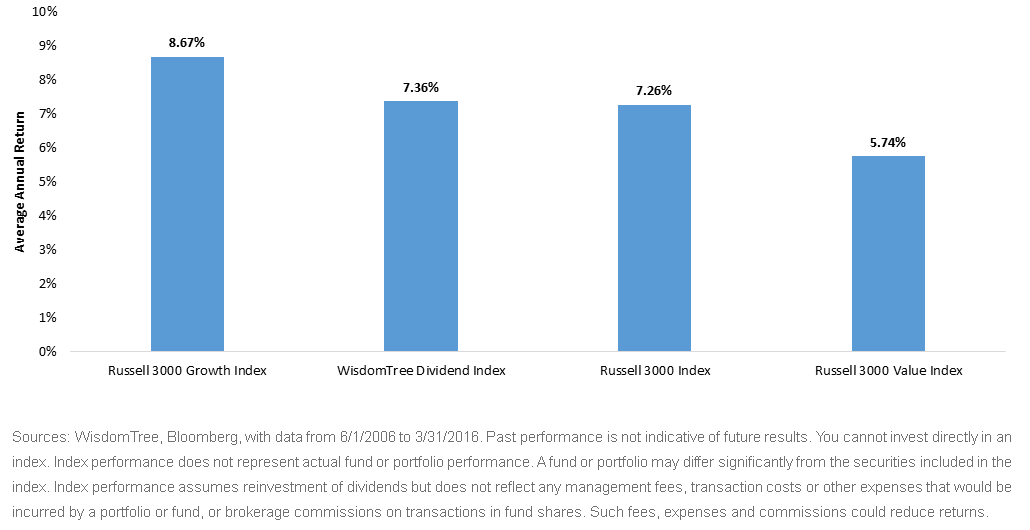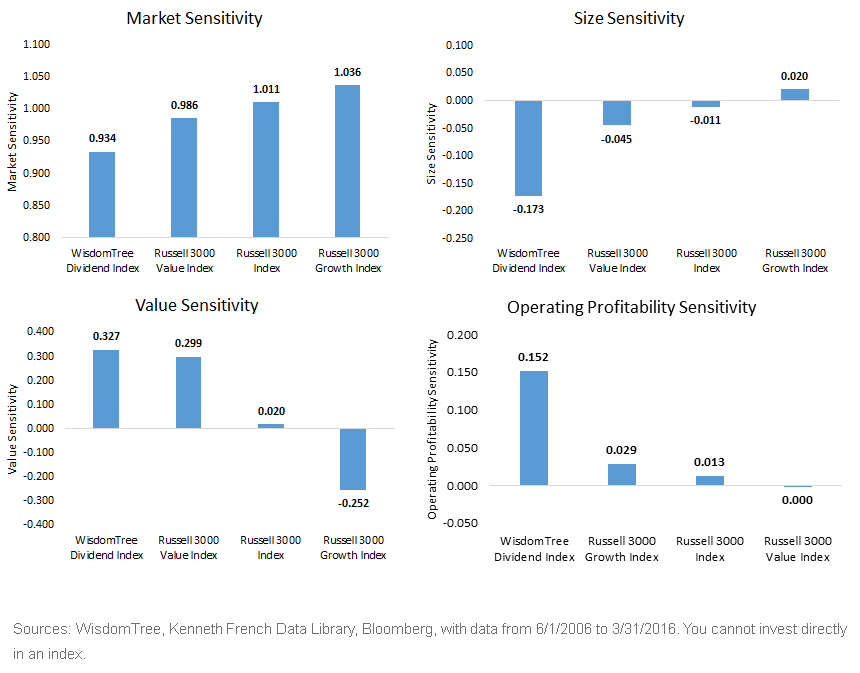
 By Christopher Gannatti, Associate Director of Research, WisdomTree
By Christopher Gannatti, Associate Director of Research, WisdomTree
Special to the Financial Independence Hub
The factor discussion is gaining popularity in the world of smart beta indexing. Size, value, momentum, minimum volatility, quality—these are all factors in the current discussion, and for the initiated they are becoming part of the common index lexicon.
But are investors really looking for these specific factors by name? We explore how these factors relate to real-world investment goals.
Translating Factors into Investment Goals
Some commonly referenced investment goals are:
• Keeping principal stable for unexpected expenses and emergencies
• Generating a certain average annual return to meet future goals in retirement
• Drawing income in order to meet planned expenses
We focus on income, as WisdomTree was the first to create a suite of U.S. equity Indexes weighted by cash dividends.
Defining the Income Factor
First, we need an Index that is governed by a set of rules that are focused on dividends but are also simple enough so as not to focus on additional things. The WisdomTree Dividend Index, we believe, may be best suited because all it seeks to do is:
• Include every dividend-paying company in the U.S.-listed equity markets that meets WisdomTree’s liquidity and market capitalization requirements. There are no selection criteria other than to find companies that have committed to paying regular dividends.
• Weight those dividend payers by the cash dividends they indicate they will pay in accordance with their stated dividend policies. This is distinctly different than weighting by dividend yield or by dividends per share or even selecting dividend payers but weighting them by market capitalization, and it therefore does not introduce biases attributable to anything other than company dividend policies and practices.
Performance of the WisdomTree Dividend Index, with Its “Income Factor,” Has Been Strong
• In a market where the growth style was in favor, the WisdomTree Dividend Index outperformed the Russell 3000 Index as well as the Russell 3000 Value Index. It should be noted that, due to the dividend focus, many initially think of the WisdomTree Dividend Index, with its focus on the U.S. income factor, as being “value in drag.” Clearly, there was something other than just value at play over this period.
• The Russell 3000 Index represents an important benchmark that is meant to be very broadly inclusive (i.e., not selective) within the U.S. equity market. The differences between this index and the WisdomTree Dividend Index can be viewed as tilts coming as a consequence of the income factor.
The Income Factor Mix: Market, Size, Value, Operating Profitability
We can see that the income factor leads to the following tilts:
1.) Lower Market Sensitivity: The interpretation here is that, in both upward- and downward-trending markets, the WisdomTree Dividend Index, with its focus on the income factor, would not be expected to capture the full movement in either direction. In some ways, one can think of this as a tilt toward “lower volatility,” at least compared to the market, where we see the Russell 3000 Index at 1.01.
2.) Sensitivity to Large Stocks: What we see here is that there is no introduction of an important bias that many would attribute to smart beta strategies—a tilt toward small caps. The thinking is that, since it is known that small caps have greater risk but also greater return over time, this is one way to potentially outperform. However, the -0.173 shows that there is a significant tilt toward larger-capitalization stocks in the WisdomTree Dividend Index, as it focuses on the income factor.
3.) Sensitivity to Value Style: We do see a tilt toward the value style, although not too much more than the Russell 3000 Value Index. It is true that most mid-cap and small-cap growth companies in the United States do not pay regular dividends, and therefore they would not find themselves included in the WisdomTree Dividend Index. This would be one of the more prominent tilts observed through a focus on the income factor in the United States.
4.) Sensitivity to Profitable Companies: On the face of it, this makes sense: companies that are not profitable may not be able to make good on their regular cash dividend policies for long. Committing to regular dividends is one way to think about potential quality, in that U.S. companies will rarely initiate a regular dividend only to then discontinue it soon after—especially when they also have such options as special dividends or buybacks at their disposal. It is interesting to see this tilt, as well as remembering that in our prior blog post it was pointed out that operating profitability, especially in large caps, has performed well over the past 10 years. This could be one element of the discussion lending clarity to the statement that the income factor is more than simply value style by a different name.
Important Risks Related to this Article
Dividends are not guaranteed, and a company currently paying dividends may cease paying dividends at any time.
Commissions, trailing commissions, management fees and expenses all may be associated with investing in WisdomTree ETFs. Please read the relevant prospectus before investing. WisdomTree ETFs are not guaranteed, their values change frequently and past performance may not be repeated. Past performance is not indicative of future results. This material contains the opinions of the author, which are subject to change, and should not to be considered or interpreted as a recommendation to participate in any particular trading strategy, or deemed to be an offer or sale of any investment product and it should not be relied on as such. There is no guarantee that any strategies discussed will work under all market conditions. This material represents an assessment of the market environment at a specific time and is not intended to be a forecast of future events or a guarantee of future results. This material should not be relied upon as research or investment advice regarding any security in particular. The user of this information assumes the entire risk of any use made of the information provided herein. Neither WisdomTree nor its affiliates provide tax or legal advice. Investors seeking tax or legal advice should consult their tax or legal advisor. Unless expressly stated otherwise the opinions, interpretations or findings expressed herein do not necessarily represent the views of WisdomTree or any of its affiliates. The MSCI information may only be used for your internal use, may not be reproduced or re-disseminated in any form and may not be used as a basis for or component of any financial instruments or products or indexes. None of the MSCI information is intended to constitute investment advice or a recommendation to make (or refrain from making) any kind of investment decision and may not be relied on as such. Historical data and analysis should not be taken as an indication or guarantee of any future performance analysis, forecast or prediction. The MSCI information is provided on an “as is” basis and the user of this information assumes the entire risk of any use made of this information. MSCI, each of its affiliates and each entity involved in compiling, computing or creating any MSCI information (collectively, the “MSCI Parties”) expressly disclaims all warranties. With respect to this information, in no event shall any MSCI Party have any liability for any direct, indirect, special, incidental, punitive, consequential (including loss profits) or any other damages (www.msci.com) “WisdomTree” is a marketing name used by WisdomTree Investments, Inc. and its affiliates globally. WisdomTree Asset Management Canada, Inc., a wholly-owned subsidiary of WisdomTree Investments, Inc., is the manager and trustee of the WisdomTree ETFs listed for trading on the Toronto Stock Exchange.




